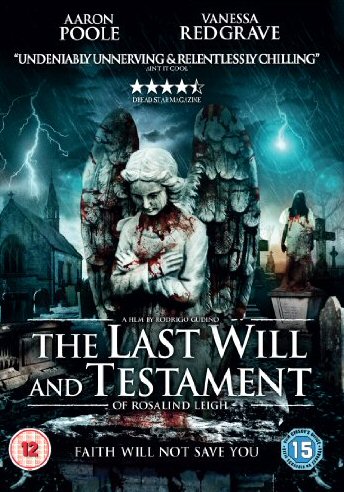
"When faith is gone, loneliness can be a monster".
Leon (Aaron Poole) is a greaser in his early 30s who makes a modest living by dealing in antiques. It's this mindset that he brings with him when he inherits his recently deceased mother's imposing, spooky house.
Tucked away behind overgrown greenery in the middle of the sticks, it is the dying wish of his mother Rosalind (Vanessa Redgrave) that her estranged son should finally return to the home he was brought up in.
The film opens to her gravelly tones, the aging actress' voice narrating a letter she'd written to her son as part of her will. In it, she expresses her loneliness without him and regret for the events that drove them apart. She goes on to highlight her disappointment at the fact that Leon didn't even return home to attend his father's funeral a few years earlier, and then proceeds to explain how she consoled herself with a profound belief in angels.
Decidedly nonplussed by the whole thing, Leon surveys the house anyway and sets up camp there for a few nights - with the initial intention of weighing it up for a sale.
A religious statue catches his eye. He recalls it from his childhood. Alarmingly, it later turns up on top of the television in the living room. Who put it there? Is Leon not alone in the house, as he thought?
A telephone call to his ex-lover, Anna (Charlotte Sullivan) - also a psychologist - leaves Leon accepting the fact that he's in denial about something-or-other and probably moved the statue himself without realising. In the back of his mind though, he knows better ... and it's not the only weird thing that's happened since he arrived there.
For a start, what's with all the weird angel-related paraphernalia and corny slogans embroidered in picture frames throughout the house ("faith is fragile", etc)? Who's the freaky neighbour who turns up asking him to join the locals in a religious meeting, while simultaneously warning of a dangerous animal that lurks in the surrounding forestry? Why does the TV switch itself on whenever God's word is being preached onscreen?
And what the fuck is that strange thing shifting shape on the sole CCTV camera that's been set up outside Rosalind's house?
Death. Faith. Guilt. These are the themes being explored in Rue Morgue magazine editor Rodrigo Gudino's feature debut. Big issues for certain, set in a paradoxically intimate universe in which just one person graces the screen (everyone other than Leon is heard but not seen).
Redgrave's voice wavers with age and regret, providing an authorative solemnity to proceedings whenever it appears over the action. She gets the best lines, especially in the moving denouement where these themes are really pulled together in an unexpectedly moving, haunting manner.
The film is short at 77 minutes long but some may still find it to be a hard slog, such is its measured pace and reluctance to adhere to modern audiences' expectancies of gore and cheap thrills. There's none of that, folks; this is much more akin to a Ti West film in its low-key, restrained approach to ghost story-telling. As in THE HOUSE OF THE DEVIL, there are a lot of scenes of one character walking around a big house, discovering little clues here and there as to what's gone on previously.
However, as luscious as the set design and cinematography truly are, the film relies too much on Poole as its focal point. He lacks the persona to overcome his character's initial, necessarily mercenary demeanour and instead is ultimately unlikeable. I was so put off by him that I couldn't help but notice that his annoyingly dry, nasal voice sounded just like Mike Lackey's from STREET TRASH. That voice is fine when delivering crude quips like those found in TRASH; here, the pace is laconic and the mood is sombre enough for you to really home in on it ... and get irritated by it.
Gudino deserves plaudits for eschewing the easy option of soaking the screen in blood and teenage boobies. He wants viewers to respect his film's artistic integrity, admire his serious intent and get spooked all at the same time. He's marginally successful on all three counts.
Metrodome's DVD presents the film uncut in its original 1.85:1 aspect ratio, enhancing the picture for 16x9 television sets.
The image quality is excellent, boasting true colours and deep blacks along with nice depth of detail and sharp, clean compositions. My guess is the film was shot using a HD camera, as it looks fantastic throughout.
English 2.0 is solid enough, offering an even and noise-free balance between sound effects and dialogue.
The disc's static main menu page offers access to a similarly static scene-selection menu. The latter provides remote access to the film via 12 chapters.
There are no extras associated to ROSALIND LEIGH on the DVD. In fact, all we get in the way of "bonus features" are two trailers which are defaulted to open the disc: the MANIAC remake, and LOVELY MOLLY.
THE LAST WILL AND TESTAMENT OF ROSALIND LEIGH is a low-key ghost story with a serious intent at heart. If you're looking for cheap thrills you won't get them here, but if you want something a little more refined, and perhaps thought-provoking - this may just fit the bill.
Review by Stuart Willis
| Released by Metrodome |
| Region 2 PAL |
| Rated 18 |
| Extras : |
| see main review |